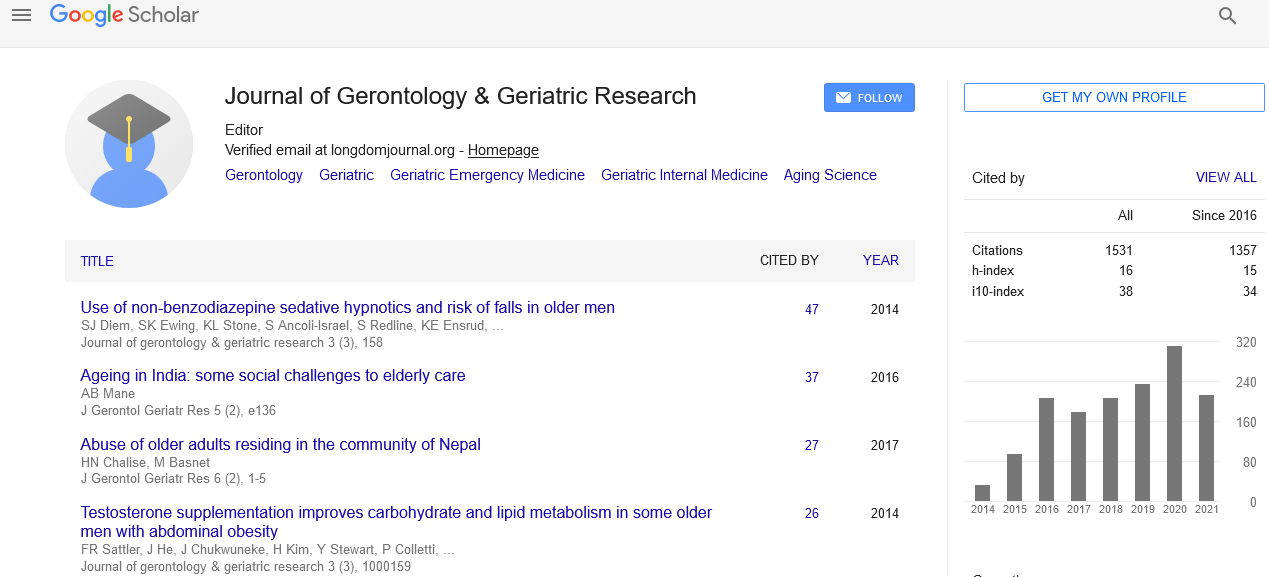PMC/PubMed Indexed Articles
Indexed In
- Open J Gate
- Genamics JournalSeek
- SafetyLit
- RefSeek
- Hamdard University
- EBSCO A-Z
- OCLC- WorldCat
- Publons
- Geneva Foundation for Medical Education and Research
- Euro Pub
- Google Scholar
Useful Links
Share This Page
Journal Flyer

Open Access Journals
- Agri and Aquaculture
- Biochemistry
- Bioinformatics & Systems Biology
- Business & Management
- Chemistry
- Clinical Sciences
- Engineering
- Food & Nutrition
- General Science
- Genetics & Molecular Biology
- Immunology & Microbiology
- Medical Sciences
- Neuroscience & Psychology
- Nursing & Health Care
- Pharmaceutical Sciences
â??Difficult patientsâ?Â: What can they teach us?
2nd International Conference on Geriatrics & Gerontology
August 24-26, 2015 Toronto, Canada
Monica O Gyimah
Kingston General Hospital, Canada
Scientific Tracks Abstracts: J Gerontol Geriat Res
Abstract:
Most clinicians have probably dealt with patients they would rather not encounter. These patients are variously referred to as �??uncooperative,�?� �??noncompliant,�?� �??demanding,�?� �??patients with thick charts,�?� or �??high maintenance,�?� among others. Typically, interactions between clinicians and such patients are deemed unsatisfactory. Some studies estimate that �??difficult�?� interactions constitute about 15% of all physician-patient interactions. This paper discusses such difficult interactions and what clinicians could learn from them. While some of the difficult interactions may be blamed on patients, clinicians and the health care culture are also partly responsible. In many cases patients are only attempting to understand and maintain control over their care through personal advocacy. In doing so, they are often misunderstood and are labeled as �??uncooperative�?� or �??difficult.�?� Some clinicians�?? perceptions of �??good patients may be attributed to whether the patient goes along with proposed care plans and treatments and/or not questioning clinicians. Such �??good patients�?� are those who allow clinicians to be the experts, determining the terms of their care. My question is whether the culture of �??clinicians know best�?� constitutes good, collaborative care. Could these �??difficult patients�?� teach us anything about ourselves and our service provision? Are there benefits to the behaviors of these apparently difficult patients? Perhaps they may present opportunities for improving communication and care delivery. In order to deliver effective and efficient patient-centered care it is incumbent upon us to develop approaches that would help us understand and effectively communicate with these patients.
Biography :
Monica O Gyimah graduated with Master of Social Work degree from Carleton University, Ottawa, Ontario, Canada in 2007. She has worked on the acute Medicine Service, in the Emergency Department and “Medicine Short Stay Unit” for 6 years doing crisis interventions and discharge planning. In the last 2.5 years, she has been working strictly with the Alternate Level of Care (ALC) patients many of who have Dementia, Parkinson’s, and other complex medical conditions. Prior to being a social worker, she had completed a Masters Degree in Social Geography, and had worked at Western and Queen’s Universities, and has co-authored at least two publications.
Email: gyimahm@KGH.KARI.NET


